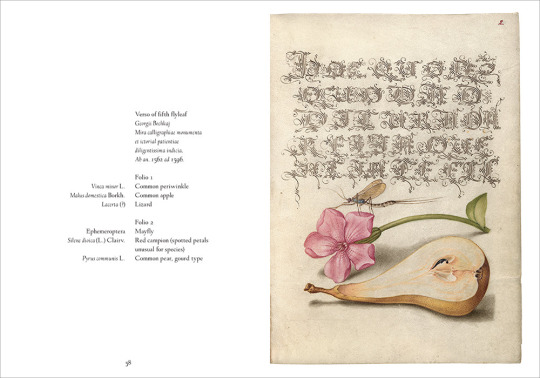#Monumenta
Explore tagged Tumblr posts
Text

Been playing Monumenta, rekindled my love for Minecraft.
#goldenart#minecraft#monumenta#shoutout to jesters#this is my new mc skin btw theres a very obvious inspiration#btw the literal next day this design became outdated cus i got new pants and a new off hand item#btw btw im a cleric and i love healing my friends
7 notes
·
View notes
Video
Untitled by Iason Ragnar Bellerophon
#iason ragnar bellerophon#jason robert bell#Studio Art#iason#ragnar#bellerophon#studio#Alloutshelter#Mystic: Body Double for God#World's Greatest Living Thothist#Cavemanrobot#Lord High Archon Number Eight#Oversoul Seven#Jace the Ace from Hyperspace#Cartoonist#Sexpressionist Painter#Sidewalksurfer#Skatemaker aka Jason Robert Bell Beautiful Greenberg#Monumenta#New Korpoils#The Untitled Snakes of Assyria#Helios Three#Sol#Milky Way#The Red Universe#or as I call it#home… Weltanschauungbackpfeifengesicht‽—#flickr
1 note
·
View note
Text
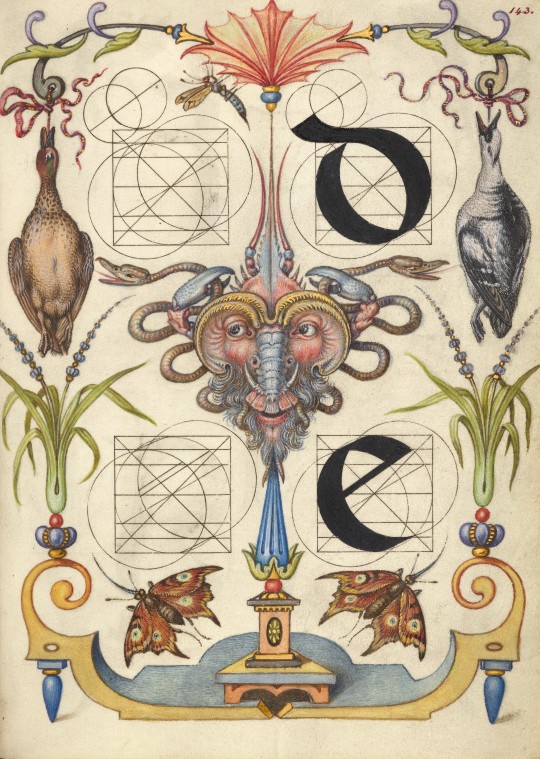
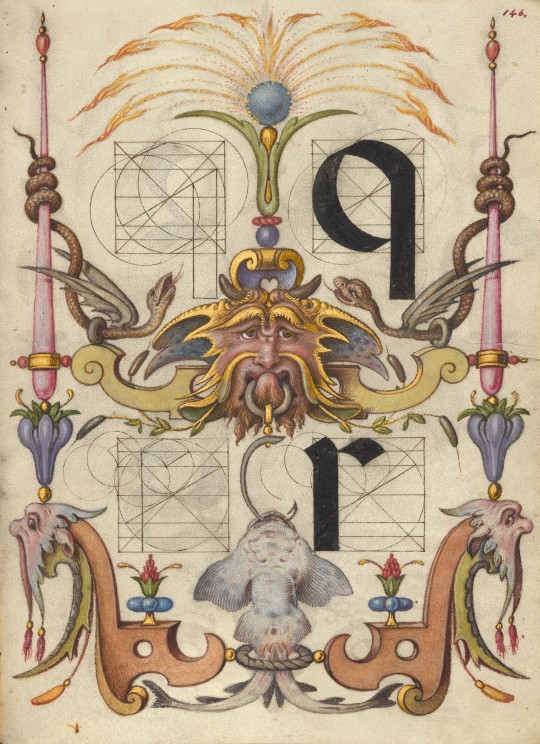
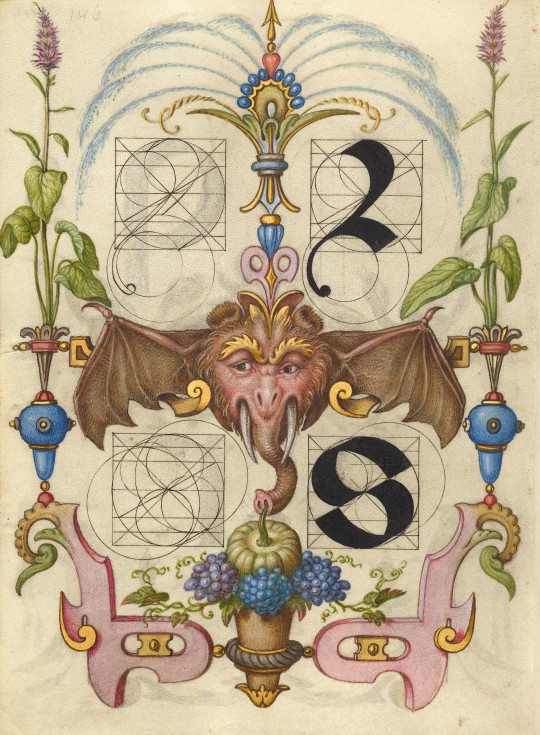
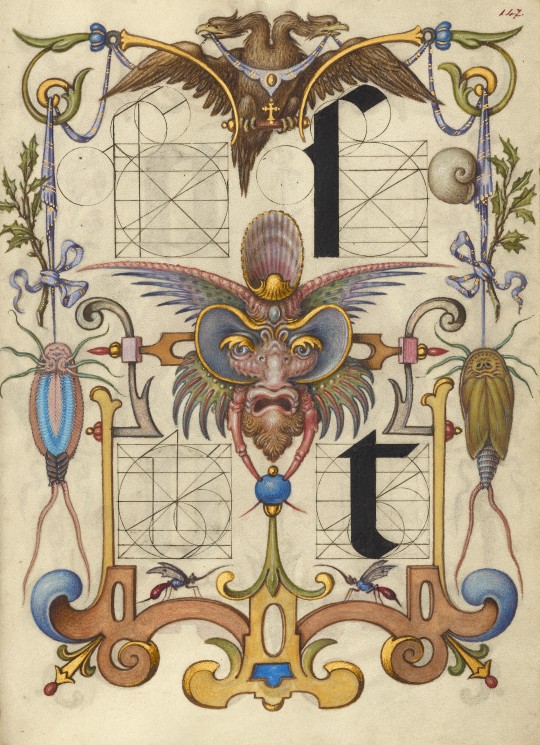
"guide to the construction of letters"
pages from the "model book of calligraphy", vienna, originally created by georg bocskay from 1561-62, illuminated and expanded by joris hoefnagel, c. 1591–96
source: Getty Museum Collection, Ms. 20 (86.MV.527), fol. 143r-147r
#16th century#joris hoefnagel#mira calligraphiae monumenta#model book of calligraphy#guide to the construction of letters#georg bocskay#calligraphy#geometry#diagrams#hybrids#grotesques#illuminated manuscript
1K notes
·
View notes
Text

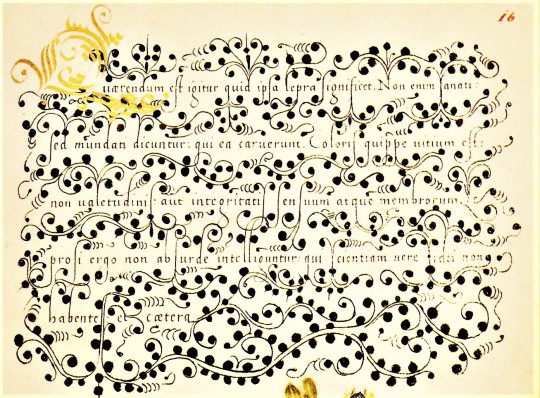

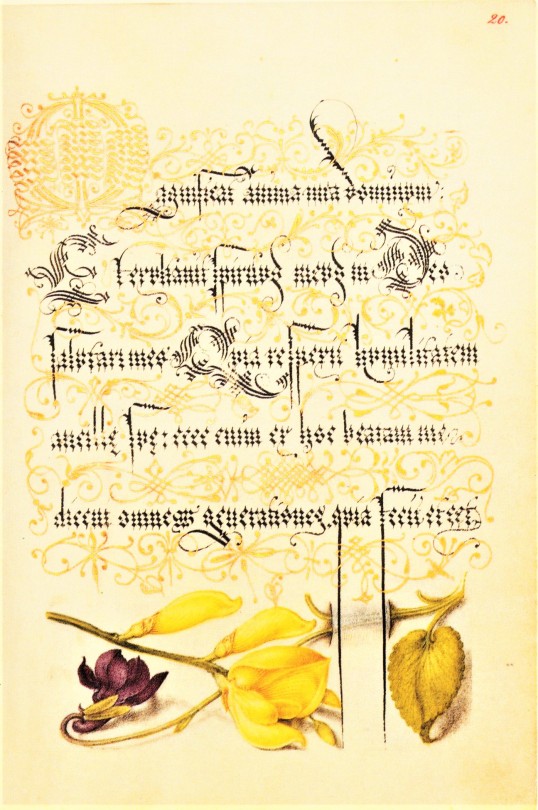


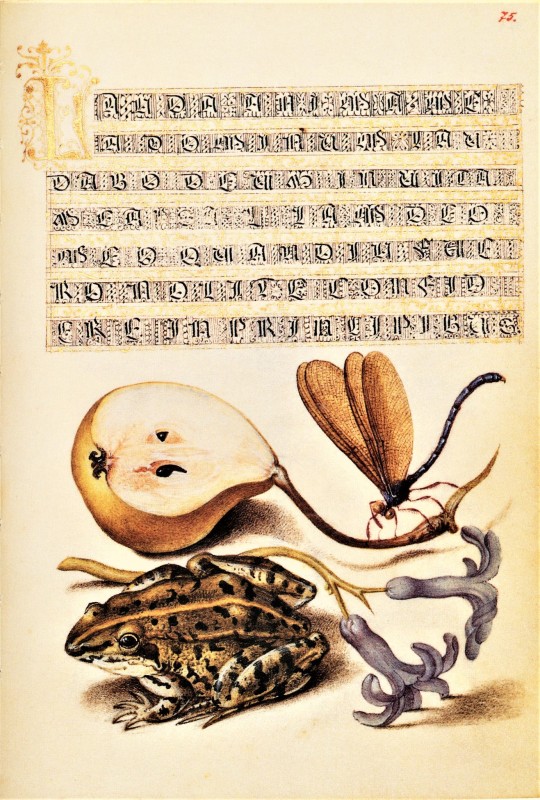



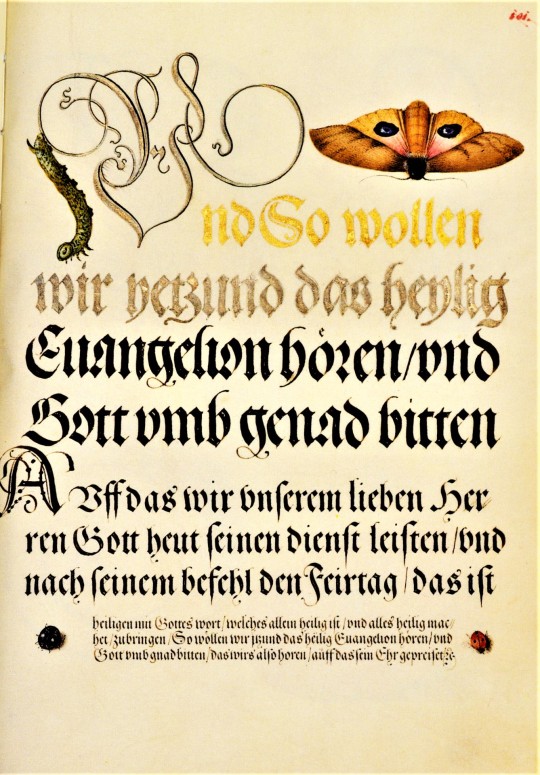

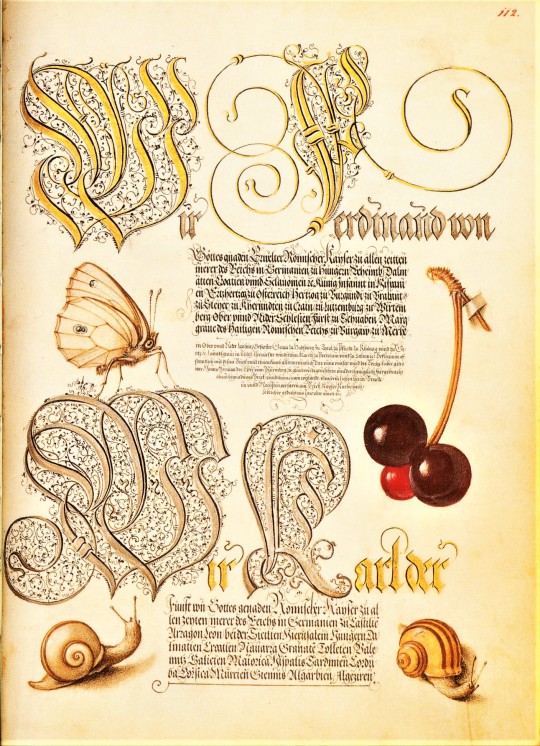
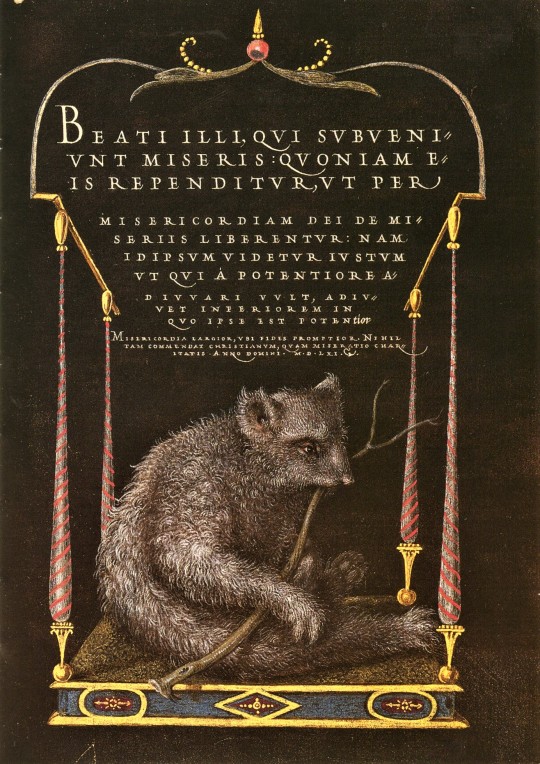
Typography Tuesday
We return to our facsimile of a 16th-cnetury calligraphic manuscript, Mira Calligraphiae Monumenta, or Model Book of Calligraphy, written in 1561/62 by Georg Bocskay, the Croatian-born court secretary to the Holy Roman Emperor Ferdinand I, and illuminated 30 years later by Flemish painter Joris Hoefnagel for the grandson of Ferdinand I, Emperor Rudolph II. The manuscript was produced by Bocskay in Vienna to demonstrate his technical mastery of the immense range of writing styles known to him. To complement and augment Bocskay's calligraphy, Hoefnagel added fruit, flowers, and insects to nearly every page, composing them so as to enhance the unity and balance of the page’s design. Although the two never met, the manuscript has an uncanny quality of collaboration about it.
Our facsimile was the first facsimile produced from the collection at the J. Paul Getty Museum in Los Angeles. It was printed in Lausanne, Switzerland by Imprimeries Reunies and published by Christopher Hudson in 1992.
View another post from Mira Calligraphiae Monumenta,
View more Typography Tuesday posts.
#Typography Tuesday#typetuesday#Mira Calligraphiae Monumenta#or Model Book of Calligraphy#Georg Bocskay#Joris Hoefnagel#illuminated manuscripts#manuscripts#manuscript facsimiles#facsimiles#calligraphy#letter forms#letters#J. Paul Getty Museum#Imprimeries Reunies#Christopher Hudson#Ferdinand I#Rudolph II
861 notes
·
View notes
Text
Alessandria cambia data di nascita: ora è ufficiale, fondata il 23 aprile 1168
La storia di Alessandria si arricchisce di un nuovo capitolo: la data della sua fondazione cambia ufficialmente e viene fissata al 23 aprile 1168, giorno di San Giorgio.
La storia di Alessandria si arricchisce di un nuovo capitolo: la data della sua fondazione cambia ufficialmente e viene fissata al 23 aprile 1168, giorno di San Giorgio. L’annuncio è stato dato ieri dal professor Paolo Grillo, ordinario dell’Università di Milano, durante il convegno “Fondare una Città, fondare una Chiesa. Alle origini di Alessandria”, organizzato nell’ambito delle celebrazioni…
#850 anni Diocesi Alessandria#Alessandria 23 aprile 1168#Alessandria e la sua identità storica.#Alessandria nel Medioevo#Alessandria today#analisi fonti storiche#Annales Cremonenses#Barbarossa e Lega Lombarda#cambiamenti celebrazioni Alessandria#cambio data storica Alessandria#città storiche del Piemonte#Civitas Nova#consoli di Alessandria#convegno fondazione Alessandria#Cremona e Lega Lombarda#cultura e tradizione storica Alessandria#documenti medievali#eventi storici in Piemonte#Google News#italianewsmedia.com#medioevo italiano#Monumenta Germaniae#Monumenta Germaniae Historica#municipi medievali#nascita di Alessandria#nuova data fondazione Alessandria#nuove interpretazioni storiche#nuove scoperte storiche#Papa Alessandro III#Pier Carlo Lava
0 notes
Text
VERDWALEN IN MONUMENTALE TEKENKUNST BIJ MUSEUM MORE


“Hantsjes op ‘e rêch”, zei ik tegen mijn zoontje van 6 wanneer wij een warenhuis of museum bezochten. Hij was een jonge onderzoeker en keek het liefst met zijn handen. “Handjes op de rug”. Kijken met de ogen, niet met de handen. Dat is sowieso een voorwaarde bij kunst in een museum, of werken op een andere plek tijdens een tentoonstelling. Hoewel ik net als mijn zoon toen, hij is nu 37 en houdt zijn handen thuis, soms wel graag wil voelen. Vooral langs de rondingen van een beeldhouwwerk. Maar ook de huid van een schilderij. Om te weten op welke manier iets tot stand is gekomen. Om de structuur van de inspiratie te ondergaan, de emotie van het scheppen te doorvoelen. Meer te kennen dan alleen het beeld te zien. Een vinger achter de oorzaak te krijgen, het waarom van het bestaan van het kunstwerk te bevatten. Het devies is echter alleen kijken, aanraken niet. En kan ik mijn aandrift niet bedwingen en beweegt mijn vinger naar het werk, dan hoor ik “hântsjes op ‘e rêch!”. Ofwel wijst mij een suppoost terecht: “meneer, wilt u niet aan de werken komen”.
In de tentoonstelling “Size Matters” in Museum MORE is het zeker af te raden de monumentale tekeningen aan te raken. Al zou ik ze wel willen bevoelen om te onderzoeken waarmee ik te maken heb. De tekeningen zijn zo groot dat deze mijn blik in zich opnemen. Bezit nemen van mijn ervaring. De afgebeelde ruimte kan ik bijna fysiek betreden en er met de ogen in rondlopen. Bij sommige installaties is dit ook daadwerkelijk mogelijk en wordt ik geconfronteerd met evenbeelden, nabeelden en oerbeelden. De werken nemen compromisloos de ruimte in en eisen mijn aandacht op. Van tekeningen op meterslang papier of doek tot video-animatie en ruimtevullende installaties. Doordat ik door de grootte onderdeel wordt van het kunstwerk, het mij opneemt als speler in het geheel, zal ik mijn omgeving willen gaan aanraken. De huid van de getekende mensen, de bast van planten, de structuur van gebouwen, de pels van dieren. De museale afmetingen, het gedetailleerde karakter, de massale afbeeldingen – deze komen hard binnen, veelal mede door het onderwerp dat ze aansnijden.

Het maken van een tekening is al langer een autonome kunstvorm. Was het tekenen eerder een schetsen voordat het resultaat, de schildering bijvoorbeeld, in beeld werd gebracht; tegenwoordig is het een volwaardige op zichzelf staande uiting. Het materiaal leent zich ertoe om groot formaat dragers te ‘beschrijven’. Met potlood en krijt kunnen fragmenten en onderdelen tot in finesse worden uitgelicht. De tekening is geen schets, maar een tot op de kleinste bouwsteen uitgewerkte afbeelding. Doordat er zo fijn gewerkt kan worden heeft de tekening wel de uitstraling van een fotografisch beeld. En dat zal ik dan willen voelen, het doorgronden, er kennis van nemen.
Geen snelle ontwerpen op schetspapier om de grootte, breedte en hoogte van het voornemen, de begeestering in de vingers te krijgen. Maar op de vierkante centimeter miniem en beduidend uitgewerkte inspiraties. Met actuele onderwerpen die op deze manier sterk aanspreken. Voor een deel is de fotografie aanleiding, vormen foto’s het startpunt om een thema te peilen en te ontrafelen. Kunnen bestaande indrukken onderdeel zijn van een fantastische en futuristische uitdrukking. Het is kunst om in te verdwalen, om jezelf in te verliezen.

De catalogus bij de tentoonstelling geeft inzicht in de achtergronden van de werken en de inspiraties van de makers ervan. Het laat op handzaam formaat de monumentale werken zien. Voor de echte beleving is het zaak de tentoonstelling in het museum te bezoeken. Dan kan ik effectief en wezenlijk onderdeel uitmaken van de werken. Kan ik mij er tussen begeven en me erdoor laten overweldigen. Deze kunst, tot en met 2 februari 2025 getoond in de zalen van Museum MORE, geeft een bijzondere ervaring wanneer het live wordt meegemaakt. Door in de ruimten te zijn overkomt mij de ruimte van de tekening. En krijg ik oog voor de uitzonderlijke aard van dit fenomeen in de kunst.
Was de tekenkunst eerder intiem, niet met de bedoeling openbaar te maken maar op te bergen in ladekasten, een medium dat de beschouwer het dichtst bij de kunstenaar brengt. Tegenwoordig zijn in de tekeningen nog aldoor de persoonlijke gedachten en het handschrift er het meest in vergelijking met andere uitingen in te herkennen. Dat wist het grote formaat waarop gewerkt is niet uit. Nog altijd is het potlood en het krijt de basis om handmatig te werken. En zelfs wordt de materie wel met de vingers tot een beeltenis gevormd. In de tekening zit de kunstenaar, omdat er niets tussen hem/haar en de drager staat. “Een tekening is de meest directe vertaling van het hoofd via de hand”, schrijft cultuurjournalist Edo Dijksterhuis in zijn essay in de catalogus. “Een tekening kan de essentie van de gedachte waarop hij is gebaseerd benaderen maar nooit helemaal omvatten. (…) Kunstenaars blijven vooral kunst maken omdat ze telkens net niet te pakken krijgen wat hen voor ogen staat. En die worsteling is in geen medium zo zichtbaar als in tekenkunst. Een tekening laat zich lezen als een logboek van handelingen.” Dat logboek wil ik lezen, met de vingers langs de regels gaan, het schrift aanvoelen. De handelingen meten en doorzien.

Een groep van 28 kunstenaars uit binnen- en buitenland hebben de samenstellers van de tentoonstelling aangetrokken om hun werken te laten zien. In de catalogus lichten artistiek directeur Maite van Dijk en senior conservator Marieke Jooren het idee om een grote tentoonstelling te maken over hedendaagse monumentale tekenkunst toe. De kunstenaars zelf laten zich citeren omtrent hun liefde voor tekenen. “Wat ik zie, wordt pas echt wanneer de lijn van mijn pen het heeft verkend; alles wat ik tegenkom wordt gevat in de lijnen die ik teken”, is opgetekend uit een gesprek met Anne Muntges. “Het werken op groot formaat brengt me dichter bij de finesses van de tekening.” Andere tekenaars voelen ook dat het is alsof ze binnen een zelfgeschapen wereld stappen en daarin meteen elk detail kunnen doorgronden. Door zo dicht op het werk te zitten kan de essentie van het onderwerp worden verkent en onthult. “Een groot formaat heeft als voordeel dat je objecten op ware grootte kunt tekenen”, vindt Levi van Veluw. “Het lijkt alsof je door een venster kijkt naar een andere dimensie. (…) In een tekening is alles mogelijk, er zijn geen natuurwetten. Het grote formaat helpt om de illusie van het getekende tafereel te verwezenlijken.”

Niet alleen maar wel veelal werken de kunstenaars zonder toevoeging van kleuren in hun werken. Door zwarten en grijzen op de witte drager aan te brengen krijgt de tekening een vervreemdend karakter. Dan is er geen afleiding door kleur. Het staat buiten de werkelijkheid, maar maakt er toch onderdeel van uit. Worden kleuren aan de tekening toegevoegd komt het beeld terug in de realiteit, maar spiegelt zich in een surrealiteit. Wat ik zie lijkt werkelijkheid, maar is fantasie – een gedachte met de waarheid als basis. De grens tussen werkelijkheid en verbeelding vervaagt. Raquel Maulwurf: “Ik teken met houtskool, één van de oudste kunstenaarsmaterialen. Dankzij verkoold (dus vernietigd) hout kan ik hele werelden tot leven brengen: creatie uit destructie. De reductie tot zwart-wit stript het beeld van overbodige franje.”
“De tekening wordt door de grootte een fysieke ‘opponent’ voor zowel de maker als de beschouwer”, dwaal ik in de microscopische verwondering van Hans de Wit. “Lichaam en geest raken overrompeld.” Het op afstand kunnen overzien van het geheel en het van dichtbij ervaren van motieven, detaillering en structuren zijn in zijn werk essentieel, “net als de tegenstrijdige gevoelens van bijvoorbeeld aantrekking en afkeer. Hierbij speelt ook het manipuleren van de natuurlijke schaal van de motieven een rol.” Die manipulatie van de blik, het oog om te dolen, zie ik terug in de meeste van de andere werken. Het is een bijzondere ervaring de monumentale tekenkunst live bij Museum MORE en later thuis via de catalogus “Size Matters” te bekijken. In de tentoonstelling houd ik krampachtig mijn handen op de rug en laat mijn blik verdwalen in de getekende verhalen.
Size Matters. Monumentale tekenkunst nu. Monumental drawing now. Voorwoord Maite van Dijk. Teksten Marieke Jooren, Edo Dijksterhuis. Uitgave WBOOKS Zwolle in samenwerking met Museum MORE Gorssel, 2024.
0 notes
Text
in monumenta we have the casino
Imagine... Wynncraft Gacha Game...
2 notes
·
View notes
Text






🌟 Stap in de nostalgie! 🌟
Het prachtige Centraal Station in Den Bosch met zijn iconische perronkappen is een waar juweeltje! 🏛️✨ Laat je betoveren door de charme van het verleden en geniet van de sfeer terwijl je wacht op je trein. Want wie zegt dat wachten niet leuk kan zijn? 🚉😉
#DenBosch#CentraalStation#Perronkappen#Nostalgie#Architectuur#Treinreis#Historisch#Reizen#OntdekDenBosch#BosscheSfeer#Monumentaal#Perron#Treinliefhebbers#Reisgenot#WachtMetStijl#Sfeervol#ArchitectuurFotografie#NJoyPictures#ReisMetEenGlimlach#PerronPlezier
1 note
·
View note
Text
Kapuscinski: 'wat ons met de Ander verbindt'
bron beeld: diariovivo.com Ryszard Kapuscinski (1932-2007) was reisjournalist en schreef een aantal reisboeken die monumentaal mogen worden genoemd. Aan het einde van zijn leven verzamelde hij een zestal lezingen die gaan over de ontmoeting met de Ander, de vreemdeling. De Pool beschouwde de ontmoeting met de Ander als een universele en fundamentele ervaring. Conflict, oorlog en geweld zijn…
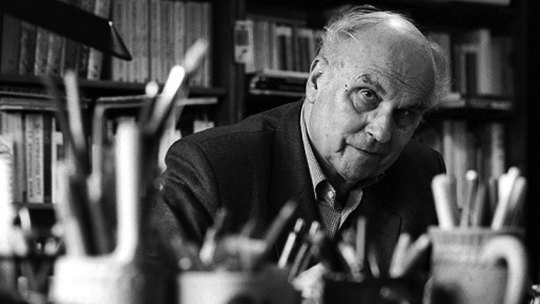
View On WordPress
#20-ste en 21-ste eeuws#communiceren#culturen#de ander#dialoog#ervaring#falen#fundamenteel#gemeenschappelijkheid#globalisering#Joseph Conrad#journalist#levenseinde#lezing#luisteren#mededogen#migratie#monumentaal#ontmoeting#Pinsk#Planeet van de Grote Kans#Polen#reizen#schrijver#solidariteit#universeel#verbondenheid#vluchtelingenstroom#welwillende houding#wereldvolkeren
0 notes
Text
For #FrogFriday + #DragonflyWeek:

Joris Hoefnagel (Flemish, 1542-1600) & Georg Bocskay (Hungarian, d.1575)
Common Pear, Lake Demoiselle, Moor Frog, and Hyacinth: Mira calligraphiae monumenta, Ms. 20 (86_MV_527), fol. 75
1561–1562; illumination added 1591–1596
Watercolors, gold & silver paint, ink
16.6 × 12.4 cm (6 9/16 × 4 7/8 in.)
Getty Museum collection
#animals in art#animal holiday#european art#illuminated manuscript#Hungarian art#Flemish art#natural history art#calligraphy#16th century art#Getty Museum#Frog Friday#Dragonfly Week#frog#Joris Hoefnagel#insect#damselfly#Georg Bocskay#amphibian
29 notes
·
View notes
Video
#kingshitofturdtown by Iason Ragnar Bellerophon
#instagram app#square#square format#iphoneography#uploaded:by=instagram#iason ragnar bellerophon#jason robert bell#Studio Art#iason#ragnar#bellerophon#studio#Alloutshelter#Mystic: Body Double for God#World's Greatest Living Thothist#Cavemanrobot#Lord High Archon Number Eight#Oversoul Seven#Jace the Ace from Hyperspace#Cartoonist#Sexpressionist Painter#Sidewalksurfer#Skatemaker aka Jason Robert Bell Beautiful Greenberg#Monumenta#New Korpoils#The Untitled Snakes of Assyria#Helios Three#Sol#Milky Way#The Red Universe
0 notes
Text
Sexualization extended to images of reading, too. Many of the paintings and prints produced by Moronobu and his contemporaries, for instance, depict not “respectable” women but courtesans in the act of reading (see figure 4), and in many scenes the implied narrative is that reading gives way to sex, for in many a shunga scene books lie scattered about the floor. Sometimes the woman portrayed reading is clearly stated not to be a courtesan, but is nevertheless shown in a situation of intimacy (see figure 2). Even the most sober didactic works were not immune to treatment of this sort. A particularly apposite example is an erotic parody of Onna daigaku. This inevitably anonymous and undated piece, entitled Onna dairaku 女大楽(Great Pleasure for Women) and probably published in the 1720s, includes a scene in which a woman’s reading is interrupted by a man who is genitally stimulating her from the other side of the kotatsu. Here the very act of reading is invaded by the fantasies of the erotic tradition.
peter f. kornicki, "unsuitable books for women? genji monogatari and ise monogatari in late seventeenth-century japan," monumenta nipponica vol. 60 no. 2
11 notes
·
View notes
Photo

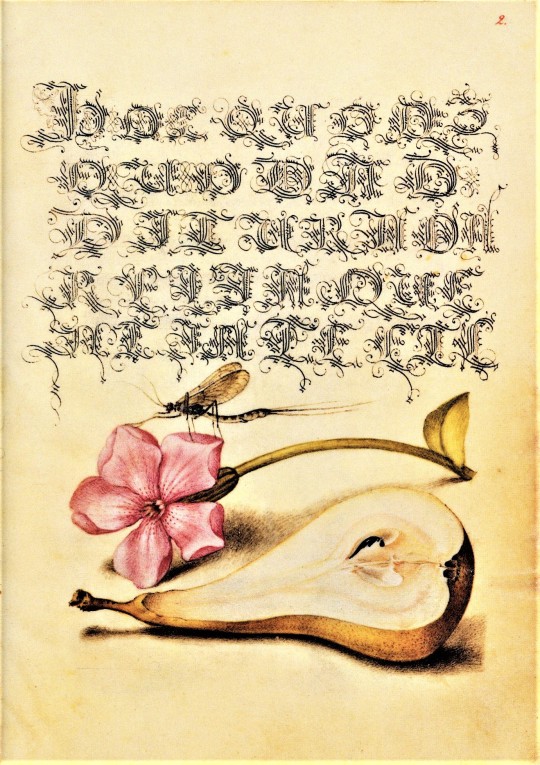
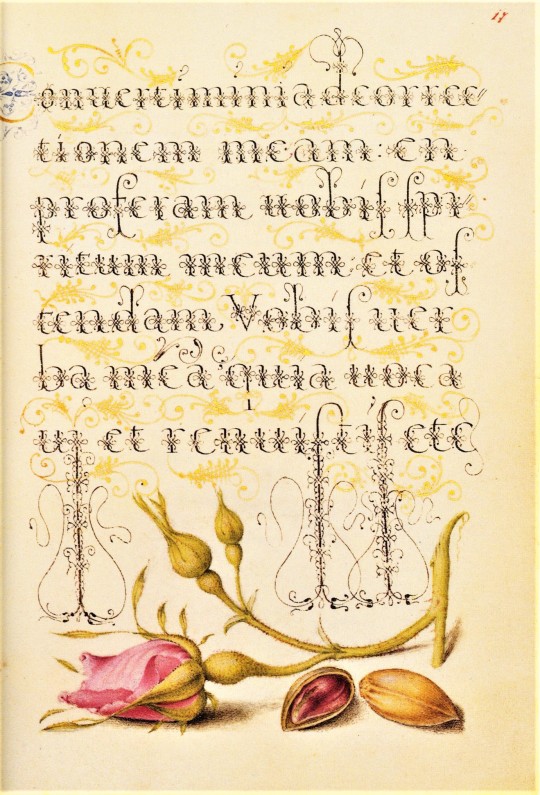




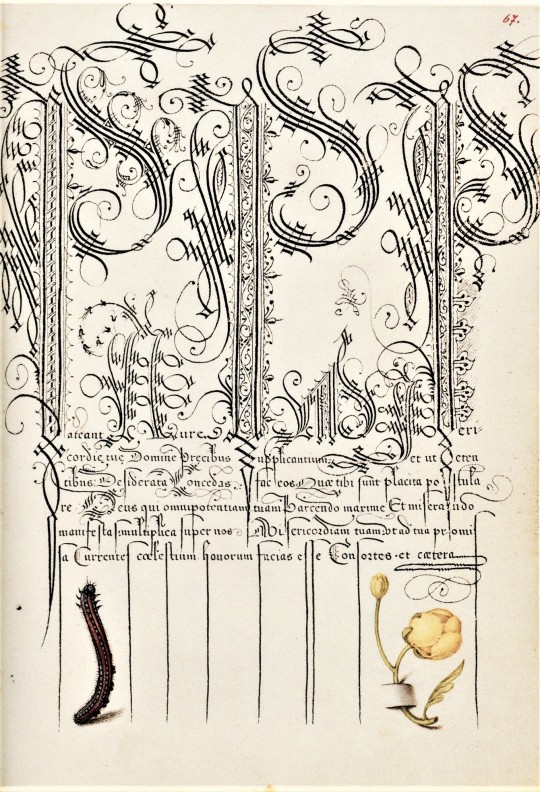

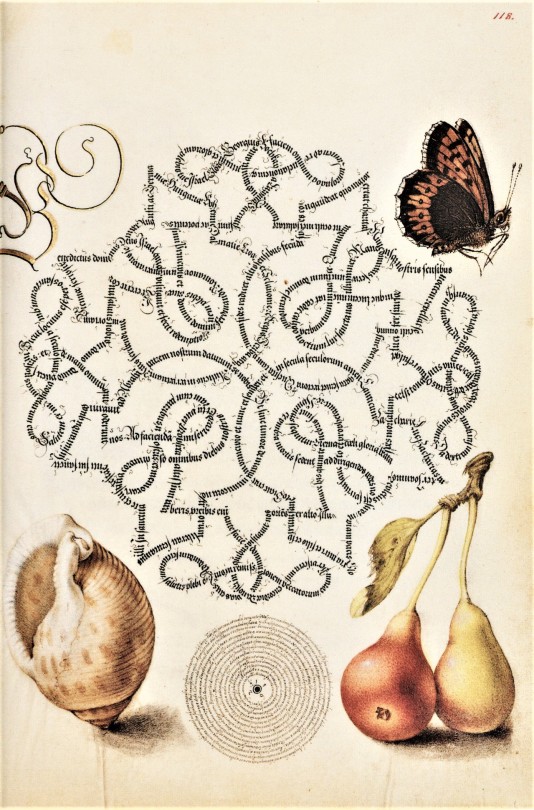
Typography Tuesday
Sometimes, things in our collection still surprise me, even after 29 years. From our fairly sizable manuscript facsimile collection, I was surprised I had never encountered this little (5 X 7 in.) reproduction of a 16th-cnetury calligraphic manuscript, Mira Calligraphiae Monumenta, the first facsimile produced from the collection at the J. Paul Getty Museum in Los Angeles, printed in Lausanne, Switzerland by Imprimeries Reunies and published by Christopher Hudson in 1992.
As the relatively new invention of printing came to dominate the production of books by the 1500s, the calligraphic inventiveness of scribes became prized for their aesthetic qualities rather than their production value.
From 1561 to 1562, Georg Bocskay, the Croatian-born court secretary to the Holy Roman Emperor Ferdinand I, created this Model Book of Calligraphy in Vienna to demonstrate his technical mastery of the immense range of writing styles known to him. About thirty years later, Emperor Rudolph II, Ferdinand's grandson, commissioned the [Flemish painter] Joris Hoefnagel to illuminate Bocskay's model book. Hoefnagel added fruit, flowers, and insects to nearly every page, composing them so as to enhance the unity and balance of the page's design. -- Getty Museum Collection webpage.
Although the two never met, the manuscript has an uncanny quality of collaboration about it.
Today we only show 11 pages from the facsimile, but we hope to present more from this highly-inventive manuscript of calligraphic virtuosity in the future.

View more Typography Tuesday posts.
-- MAX, Head, Special Collections
#Typography Tuesday#typetuesday#Typography Tuesday#Mira Calligraphiae Monumenta#Georg Bocskay#Joris Hoefnagel#calligraphy#letter forms#letters#J. Paul Getty Museum#Imprimeries Reunies#Christopher Hudson#illuminated manuscripts#facsimiles#manuscript facsimiles#Ferdinand I#Rudolph II
141 notes
·
View notes
Text



Pages from Mira calligraphiae monumenta, made in Austria, late 16th century
Getty Museum
7 notes
·
View notes
Note
Nempe est quod esse pār est: portenta tanta cōnspicis stupēns jamque immemor facta es tuī (et amābilest!). Jūcunda semper est hūmāna gēns! Quem vidēs, Māui ille sum; dumque exōrdior, resūme spīritum! Nam, sōlis īnstar, sciō esse impār rēctā nostrum vīsere jubar Quid tibī plūra? Namque nīl est, quod caelum, aestum, sōlem dō! Estō sēcūra: ferre nīl est mūnuscula ista sēmidīvulō! Hei! Prōfer quī caelum ferre potest tē vāgiente (quī vir hic est), noctis algōrem quī raptīs ignibus fugat (quī vir tē nunc spectat). Pol! Phoebōque vīnctō vestrīs (et nīl est!) papandī lūcem gaudiīs aurāque captā vestrīs — et nīl est! tetendī vēla nāvitīs. Istuc quidem - quid morer tē - nīl est: sola ēmersaque factaque rūs. At tū quidem parce - namque nīl est! - HA supervacāneīs honōribus: Et nīl est! Et nīl est! Nunc perpende singula. Ocelle, vōx sit aperta tibī mea: omnia tē ēdoceō phaenomena. Aestus, grāmen, solum quid nisi nostra crepundia sunt? Viscera condita vīperea facta cocos tibi frūgifera. Quidque restat? Ut mē metuās: sīs tibi tūta, cavē impediās. Vidēn haec cutis historiās monumenta monēre meās? Omnibus auctor ad īnfera ab altō hīc miniō miniātus in ignibu' saltō. Quidquid hoc est, quid plūra? Nīl est, tibī quod bona tanta ferō. Estō sēcūra, namque nīl est: perpende singula. Interim ipse eō. Dīcitō nunc vicissim "nīl est": nam nāve tuā egeō, ut hinc procul vēla dem - et nīl est! Ūnum invidet nātūra: nōn natō. Et nīl est! Et nīl est! Valētō!
:3
This honestly made my day
5 notes
·
View notes

